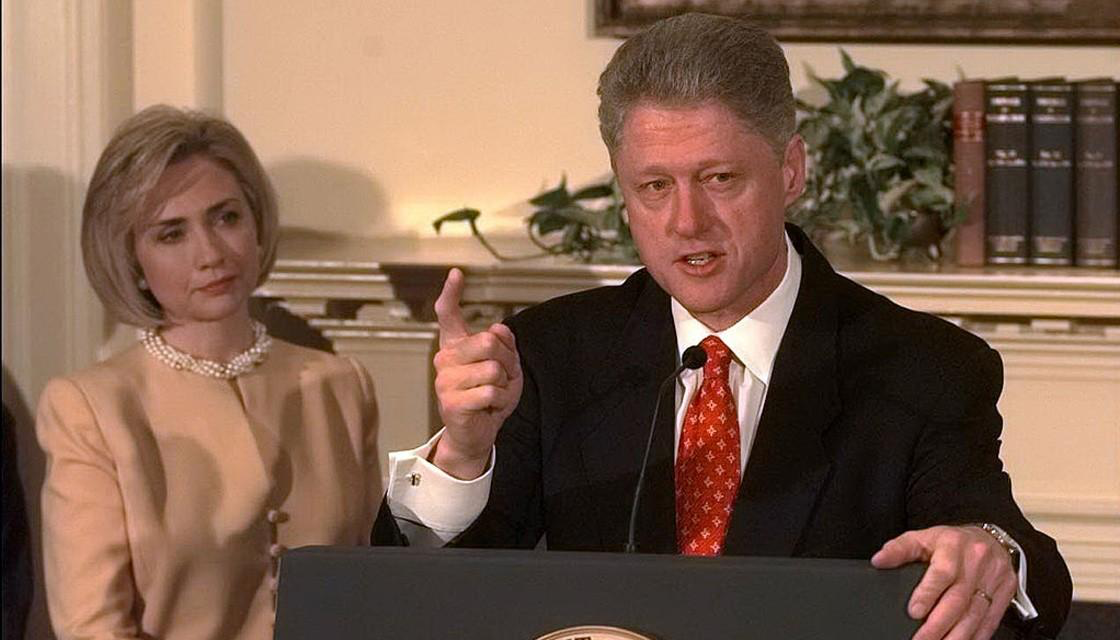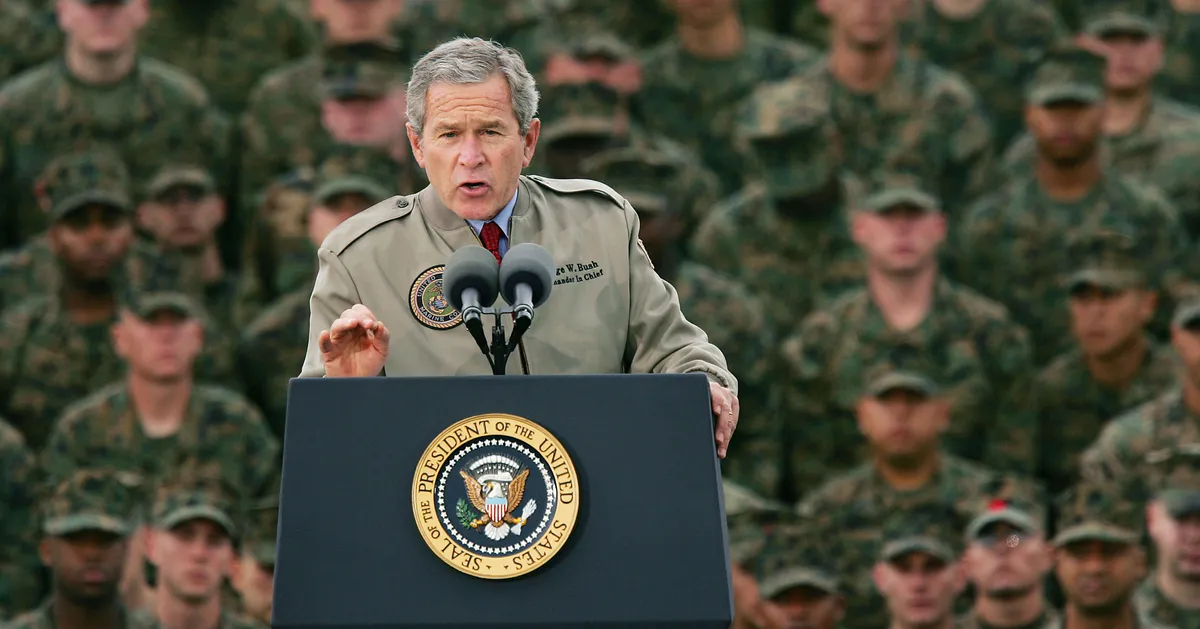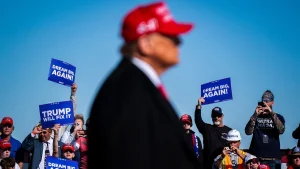In the Eyes of the Chinese, Who Is the Worst U.S. President?
If there’s one group that cares about the US presidential election more than the Americans, it must be the Chinese.
They not only care about the current president but also about past presidents. While the American people are busy choosing their next president, users on China’s version of Quora, “Zhihu,” have selected “the worst U.S. president of the past 30 years.”
It’s hard to imagine that, after years of trade wars, comments giving high praise to Trump have received over 6,000 likes. Chinese netizens, though driven by a unsurpressible desire to express themselves, still managed to apply a rigorous analytical attitude in answering the question: should it be considered from a Chinese perspective or an American one? They also try to get to the bottom of the issue when a president is voted “bad”: Is it due to the president’s own actions, or is it a reflection of the country’s fortunes?
The question, “who is America’s worst president in the past 30 years”, has garnered 4.7 million views. Based on the 270 responses it elicited, Chinese netizens overwhelmingly see George W. Bush as the worst American president, followed closely by Obama and Reagan. Clinton comes in fourth, while Biden and Trump compete for fifth and sixth places.
Below are the most liked comments :
No 6. Biden
 Biden
Biden
@Buliwyf (40 likes)
Clinton gives off the vibe of a suave lawyer (before his scandals,
Bush of an uneducated cowboy and soldier,
Obama of a smooth-talking scholar,
and Trump of a redneck teenager who’s smoked too much weed.
But Biden comes across as an old relic who could easily end up on a wall.
The president actually has little influence over the country’s overall direction, cannot bypass Congress, and cannot argue too much even with his own party.
The establishment controls Congress, while big capitalists control the establishment. What we see as U.S. foreign policy—such as the global harvesting that began after the Soviet Union collapsed, using military force to discipline dissenters, giving military-industrial capitalists large contracts, seizing oil resources around the world, and using administrative and legal tools to clear the path for U.S. capital globally—are all the results of countless discussions, negotiations, and compromises directed by numerous capitalists behind the scenes, influencing both the Republican and Democratic parties.
These are certainly not things that a president can decide or stop.
To evaluate a president’s performance, we can only look at their micro-management skills and image. Clearly, Biden is the worst; even if the others are lacking, they still make being the President of the United States seem like the pinnacle of a human life.
Biden’s shortcomings:
First, his physical condition is such that he should be assigned specialized caregivers in a nursing home, yet he was still elected president, leading the world to think, “Is this what a U.S. president is like?”
Second, he kneels everywhere, to the point that the entire world questions whether he is truly the president or in fact a culprit.
Third, his language skills, especially when compared to George W. Bush, make them seem like a pair of unlikely leaders.
Fourth, his micro-management abilities in governance are evident in the withdrawal from Afghanistan, which highlights his foreign and military policy levels. His pitiful posture of kneeling everywhere proves his domestic governance capabilities—if he had a solution, why kneel?
No. 5 Trump
 Trump
Trump
@京中产鸡毛信(39 likes)
Without a doubt, the worst president in the U.S. in the past 30 years is Trump, because he shattered the foundation of America’s dominance in the world.
1、 It’s not like the U.S. has never been defeated in wars. It has, such as the Vietnam War and the Korean War. BUt these defeats didn’t undermine America’s hegemony. Therefore, George W. Bush shoudn’t be tagged a bad president, and neither should his father.
2、It’s not like the U.S. has never elected an incompetent president. It has. Look at Hoover, Carter, and an elderly Reagan, among many others.A single incompetent president cannot destroy the United States, so nearly eighty-year-old Biden shoudn’t be tagged a bad president.
3、 It’s not like the U.S. has never witnessed societal movements, as it does now with the LGBT rights, civil rights, and populist liberalism. Early women’s movements, the Martin Luther King civil rights movement, and the sexual liberation movement of the 1970s were much more influential than the movements today.
The U.S. has also encountered large-scale fiscal deficits and financial crises before; the economic depression of the 1920s and 1930s was worse than what we see now.
Confrontation and engaging in a cold war with other countries have actually been the U.S.’s forte for over two hundred years, and strategists in the Oval Office have always operated this way.
Therefore, Obama, who was obssessed with advancing civil rights but struggled with the economy, shouldn’t be tagged as a bad president, nor should Clinton, who confronted China.
So why do I consider Trump the worst president?
Because he offended every country in the world, including America’s allies, over a mere few hundred billion in trade deficits. Without Western allies, the U.S. is nothing.
He stripped away the fig leaf of American democracy by attacking American liberalism, the establishment, and the media, calling American media “fake news,” criticizing the establishment, berating immigrants, labeling South America as a “shithole,” insulting France, belittling Canada for being weak, and attacking Germany…
After losing the election, he refused to leave, allowing a group of populists to storm the Capitol—a first in two hundred years of American history.
American democracy, media, and the spirit of freedom lost their credibility worldwide; the U.S. is no longer the beacon for oppressed peoples, immigrants, and talented individuals globally.
After Trump, America is no longer America; it may take ten Bidens to make up for it.
No. 4 Clinton
 Clinton
Clinton
@天天都很困 (728 likes)
Clinton.
The end of the Cold War provided the best timing to build a community with a shared future for humanity. The US was viewed as a beacon by the former Soviet republics, Eastern Europe, or us. The U.S. was provided an oportunity to lead all of humanity.
Instead, under Clinton’s leadership, the U.S. not only failed to take on the responsibility of being a beacon but also continuously exploited other countries and even its own citizens. He likely bears a significant part of the blame for 9/11.
After his eight years in office, the U.S. gained a multitude of enemies, fostered a new class of wealthy elites, and created a greedy Clinton family.
No. 3 Reagan
 Reagan
Reagan
@李建秋 (2833 likes)
The decline of America began with Reagan; and subsequent presidents have all been busy remedying his faults.
Reagan’s policies inevitably led to increasing wealth inequality and the outsourcing of manufacturing. This growing inequality brought about a decrease in overall societal demand, which ultimately means that even capitalists can’t make money either.
Reagan implemented two policies to cover up this issue. The first was the promotion of the so-called trickle-down theory, which is now largely debunked. The second was to increase government spending, resulting in a massive rise in debt.
(Note from the editor: “Trickle-down theory” believes that tax cuts for the wealthy or support to businesses stimlate overall economic growth, hence benefiting all social classes.)
Now, even supporters of Reagan have to admit that the fiscal spending and debt during his era were “minor flaws.” In reality, this was not a “minor flaw”; it was a significant defect.
Let’s take an example. Everyone knows about the so-called “Laffer Curve,” which claims that tax cuts will increase government revenue—this is pure nonsense. Take the major tax cut of 1981; did it stimulate the economy? Just look at the GDP growth rate in the U.S. for 1982: -1.8%. This is the kind of “good result” that Reagan produced.
Now, looking at the debt, before Reagan took office, the U.S. was the world’s largest creditor. By the time he left office, the U.S. had become the largest debtor nation. Reagan claimed he would cut taxes to increase government revenue and also promote a “small government.” So why did U.S. debt increase so much?
There are many lies involved here. If you look at spending during the Reagan era, defense and highway spending surged. Is this what you call a “small government”? Which “small government” increases government spending?
Since 1980, military expenditures have significantly increased.

While some people praised Reagan for his cutbacks to the welfare system, I find it preposterous.If the government really needed to tighten its budget, I wouldn’t have much to say about cutting expenses. But to cut welfare spending on one hand while increasing military spending on the other? The U.S. ended up with a budget deficit anyway.
Isn’t that just taking food away from the poor and handing it over to the military-industrial complex? What’s there to brag about?
Any government spending directly impacts the economy. During Reagan’s era, government spending soared—note that this is based on fiscal years, not the years of the president’s term.
Here’s a table:
The categories are: Revenue, Spending, and Surplus/Deficit, with units in billions. It indicates that all surpluses were negative.

Now, let’s compare this to the Clinton era:

See that? From 1998 to 2001, during Clinton’s presidency, the figures were positive. Have you ever seen the U.S. government have a surplus? Only during Clinton’s time did that happen.
If you examine the numbers closely, you’ll find that many lies simply cannot withstand scrutiny.
Starting from the Reagan era, America introduced a new skill that later became widely applied.
Logically, under conditions of increasing wealth inequality, capitalists’ incomes should decline due to insufficient overall demand—after all, who are they selling their products to?
But it’s okay, because Reagan invented a new method: by increasing national debt, capitalists’ incomes could still increase.
If you feel the table isn’t intuitive enough, no worries—this chart makes it clear at a glance.

Some people argue that “people at the time didn’t know the consequences of Reagan’s policies.” But how could they not know?
George H.W. Bush was very clear about it: he called it “voodoo economics.” Later, he denied it, likely because he was vice president at the time.
In reality, people were aware of the consequences; it’s just that, as politicians, there were certain things they couldn’t say openly.
No 2 Obama
 Obama
Obama
@沙羡君(1257 likes)
I consider Obama the worst American president.
Due to political correctness, the United States rarely criticizes its first black president.
For Obama, the first question we need to ask is: Is he black? In fact, apart from having a black father who left after he was two, Obama had little to do with black people during other times. Obama’s mother, in fact, comes from a very prestigious family background. She comes from an American political family and is a genuine “blue blood aristocrat”.
Since then, Obama has been dealing with white elites and receiving education from them.
Obama’s presidency was merely a form of comfort for Black people. His policy is also like this, superficially granting equal status to Black people, but in reality, has the status of black people really improved?
Let me not mention the Freud incident in the Trump era, but the Ferguson incident in the Obama era is also a very influential thing, right? African Americans in the United States had opened their arms to the first president they thought could speak for them, but in reality nothing changed.
And many of the policies implemented during the Obama era have left a lasting legacy to this day. For example, the most famous gender equality movements, such as feminist equality, LGBTQ+equality, and so on, are not really aimed at improving the status of these groups, but rather at turning them into a form of political correctness. You may eliminate discrimination on the lips, but you can’t eliminate it in the heart.
Then talk about his Medicare. Does it really benefit Americans? Based on how the United States fared during the pandemic, I really don’t know what changes his healthcare policy has made.
And for his diplomacy, it’s even more disliked. The Asia Pacific rebalancing strategy has offended China, which also requires the American people to pay the price. After all, you need to pay more resources to invest in the arms race with China. Everyone in Trump knows that if America wants to be great again, it first needs to cut military spending and so on. It can be said that Obama has completely led the political situation in the United States to a dead end.
No. 1 George W. Bush
 George W. Bush
George W. Bush
@百答通(1998 likes)
Without a doubt, it’s George W. Bush.
First, two points must be clarified:
1、We need to consider this question from the perspective of Americans. For example, I think George W. Bush is the worst president (from an American perspective), but the best president (from a Chinese perspective).
2、We must consider the state of America when he took office. We should see whether he messed up a prosperous America or made things worse during a downturn.
So, I disagree with the claim that Ronald Reagan is the worst. What kind of America did he inherit when he took office? He took over during the long-term stagflation of the 1970s, with powerful unions, a trade deficit against Germany and Japan, slow technological progress, and the old adversary, the Soviet Union, at its peak. It seemed like global communism was inevitable. America’s image had fallen to rock bottom due to the Vietnam War, and allies were not genuinely aligned. The petrodollar system had just been established and lacked credibility. At that time, the priority was survival—reviving the economy was critical, not worrying about whether America would face deindustrialization or an enormous national debt in 30 years.
It’s like when you’re about to starve; your first concern is to fill your belly, not to worry about whether you’ll develop diabetes or high blood pressure from overeating 30 years later. If someone ends up overweight because they overindulged later on, that’s their responsibility, and it has nothing to do with your need to eat when you were starving.
Without a doubt, Reagan is the greatest president of the past 40 years if you consider it from the perspective of Americans. In fact, this is something nearly all Americans agree on—don’t assume you know America better than Americans themselves.
At this point, let’s take a look at the America that Bush inherited.
For nearly half a century, there had been very few instances of budget surpluses, and this was during four consecutive years. After the collapse of its old rival, the Soviet Union, the U.S. experienced significant decline. Japan, once threatening to “buy out America,” suffered through a decade of stagnation after its bubble burst. China, having endured various humiliations, remained silent. The new technological revolution, represented by the internet, was leading the world, and the oil-dollar-debt system was being thoroughly promoted globally, allowing the U.S. to exploit resources worldwide. Several wars demonstrated America’s military might, causing all its allies to bow down.
The last four years of the Clinton administration were among the rare times of U.S. budget surpluses.
It’s not an exaggeration to say that at that time, America had both money and prestige; it was a period of great opportunity.
The challenges faced by subsequent presidents—like inadequate infrastructure, hollowing out of industries, Wall Street’s greed, serious budget deficits, heavy reliance on printing money and issuing bonds, diminishing confidence in the dollar, the rise of China, a gradually assertive Europe, and a resurgent Russia—none of these problems had became insurmountable as it did later on; he was in the best position to address these issues.
So what did he do?
He fought two wars, spent trillions of dollars, and set a precedent for unlimited money printing and national debt. Although the deficit soared in 2020, at least most of that money went directly to the people, while his trillions were effectively funneled into the pockets of arms dealers.
The war in Afghanistan was necessary, but it should have been like the Gulf War—just a punishment. Controlling a barren land like Afghanistan has no value, and the terrain is too rugged to control fully. Moreover, it was a very religious place; if the Soviets couldn’t advance secular reforms, the U.S. certainly couldn’t.
As for the Iraq War, I’ve thought long and hard but still can’t figure out the purpose. They ousted a Sunni government, only to see a Shia one take its place, causing historical enemies in Iran and Iraq to unite. They say it was about oil, but the biggest investors in Iraqi oil are the Chinese. Some claim it was to maintain the petrodollar system; fine, but if Saddam was planning to settle in euros or yuan, a strike similar to the Gulf War would have sufficed. Instead, it turned into a multi-trillion-dollar venture, with thousands of soldiers dead and the U.S. stained by the conflict.
Not to mention, in the name of counter-terrorism, the U.S. cozied up to China, allowing this potential rival to grow into a dragon during his presidency—a nightmare that all subsequent American presidents will face for decades.
Of course, from the perspective of the Chinese people, he is undoubtedly the greatest American president.
As we write this article, the U.S. elections have not yet concluded, and the list of answers to “the worst president in the past 30 years” is still being updated.
Among the “invalid votes” we have excluded, many people have responded with “every president” and “the next president.”
Editor: Zhongxiaowen




Anonymous
Very reasonable, and very well-presented arguments. We will no doubt have a new occupant in due course, who will be looking at very nearly $40 Trillion in debt by the time the reins of power are handed over in January next year.